NEW BERN — Abandoned and derelict boats dot waterways and marshes all along the N.C. coast, in some cases creating hazards to navigation and other safety or environmental problems, but aside from a handful of local regulations in various communities little has been done to address the problem.

Judy Hills, director of the Eastern Carolina Council of Governments, a lifelong boating enthusiast and a former longtime member of the Coast Guard Auxiliary, has worked nearly 10 years to focus attention on ways to better manage issues with abandoned and derelict vessels and other large debris in public waters. The council, or ECC, is gathering input from the public through an online survey. The survey results are to be used to assess the extent of the problem and shared with various agencies at a meeting to be held later this year in collaboration with N.C. Sea Grant, a research, education and outreach organization based at N.C. State University. The survey will be open until Sept. 4.
Supporter Spotlight
Hills would like to see comprehensive, statewide legislation to address the issue, cooperation among various agencies, enforcement action and a renewable, sustainable funding source to remove abandoned boats and other marine debris. She said action is needed because abandoned vessels can have onboard fuel and other hazardous materials. Also, larger boats can become illegal dump sites or, in some cases, used for meth labs or other illegal purposes. Some obstruct public or private waterways, wharves, piers and ramps. Meanwhile, Hills said, the N.C. General Assembly has responded in the past only with a few “spotty” local bills that treat the problem as similar to that of abandoned vehicles.
“The issue is much more complex than that of an abandoned car,” Hills said.
The ECC is a regional planning agency serving nine counties, four of which are coastal counties: Carteret, Craven, Onslow and Pamlico. The council received federal money through a water quality grant in 2006 to study the scope of the problem of abandoned and derelict vessels in the state in partnership with three other councils of government and the Coast Guard Auxiliary. That study was completed in 2007 and presented to the N.C. Division of Coastal Management’s Coastal Resources Advisory Council and other groups since then, but no progress has been made on this issue and no state agency appears willing to take the lead, Hills said.
“No one has taken ownership of the issue,” she said. “The problem is, every state agency feels like they’re overworked.”

Various agencies have jurisdiction and enforcement powers. The Army Corps of Engineers investigates vessels that have sunk or that affect a navigable channel. The Coast Guard investigates possible contamination and may remove vessels or mark them as hazards to navigation. The Federal Emergency Management Agency can reimburse applicants for cost of vessel removal and disposal after storms. The National Oceanic and Atmospheric Administration may offer grants to remove marine debris. A state Wildlife Resources officer may be able to cite an owner for littering, but often owners cannot be identified or located.
Supporter Spotlight
In 2007, the auxiliary documented 44 abandoned and derelict vessels and 11 cases of major debris in coastal waters.
Hills said she thinks there were many more than were documented and that those numbers have since increased. Discussions resumed in 2014 when Oriental town commission Larry Summers, an avid kayaker, raised the issue.
“There’s a lot of stuff in the waterways and it’s an extremely complicated process to get rid of them,” Summers said. “There is no reasonable procedure. It might take a year or two to remove something, if then. You can’t get them out of there and they sit there forever.”
When there are circumstances in which derelict boats may be legally removed, the costs can be excessive, Summers said.
Storms, particularly hurricanes may be to blame for many vessel groundings, abandonments and related debris. Economic stress and other changes, such as the decline of commercial fishing industries in villages and small towns and financial problems for individual owners are also to blame, Hills said. Other factors include recreational boat owners who reside elsewhere and are unavailable for maintenance or monitoring, accidental groundings, the high costs of proper vessel disposal and vessels awaiting scrapping or surplus.
Summers said many of the examples he’s seen are recreational boats, but he’s aware of at least one big commercial fishing boat sunk near the town and several others around Pamlico County he believes were intentionally sunk. There have been cases of boats striking the sunken vessels. One example, he said, is an old sailboat submerged within about 10 feet of the channel in the Intracoastal Waterway near Hoboken. Other boats have washed up onshore. In many cases, it’s impossible to determine the owner because registration numbers have been intentionally removed or obliterated.

In addition to the hazards, the problem is an eyesore in coastal communities where visitors in search of scenic views are a big part of the local economy.
“It doesn’t help you when you’re trying to do tourism,” Summers said.
Hills provided an update on the issue to the N.C. Coastal Resources Commission earlier this year. In her presentation, she focused on the inconsistency of regulations that apply to derelict and abandoned vessels. A big part of the problem is the variations in defining what qualifies as an abandoned vessel.
The N.C. Wildlife Resources Commission’s definition is a vessel that has been relinquished, left or given up by the lawful owner without the intention to later resume any right or interest in the vessel. The term does not include a vessel that is left by an owner or agent of the owner with any person or business for the purpose of storage, maintenance or repair and that is not subsequently reclaimed.
The Coast Guard’s definition of abandoned vessel is any craft designed for navigation that has been moored, stranded, wrecked, sunk or left unattended for longer than 45 days. A vessel is not abandoned if it is on private property with permission of the owner, according to the Coast Guard.
A law enacted in May 2011 gave Wrightsville Beach authority to remove and dispose of abandoned vessels within the town’s zoning jurisdiction. The law applies only to Wrightsville Beach and includes yet another definition of abandoned vessels as those “moored, anchored or otherwise located for more than 30 consecutive days in any 180-day consecutive period in any waters or marshes waterward of the pierhead line” and “If designed to float, is in danger of sinking, has sunk, is resting on the bottom or is located such that it is a hazard to navigation or is in immediate danger to other vessels.”
Another law enacted in June 2013 giving only Brunswick and Dare counties the right to develop an ordinance prohibiting the “abandonment of vessels in navigable waters” is the General Assembly’s most recent action on abandoned vessels. Hills and Summers agreed those local laws have failed to address the problem.
“We really felt like there’d been nothing done – no progress. With help from Sea Grant, we’re going to make another run at it,” Hills said.







